
Awesome-Embedded
A curated list of awesome embedded programming.
Stars: 5356
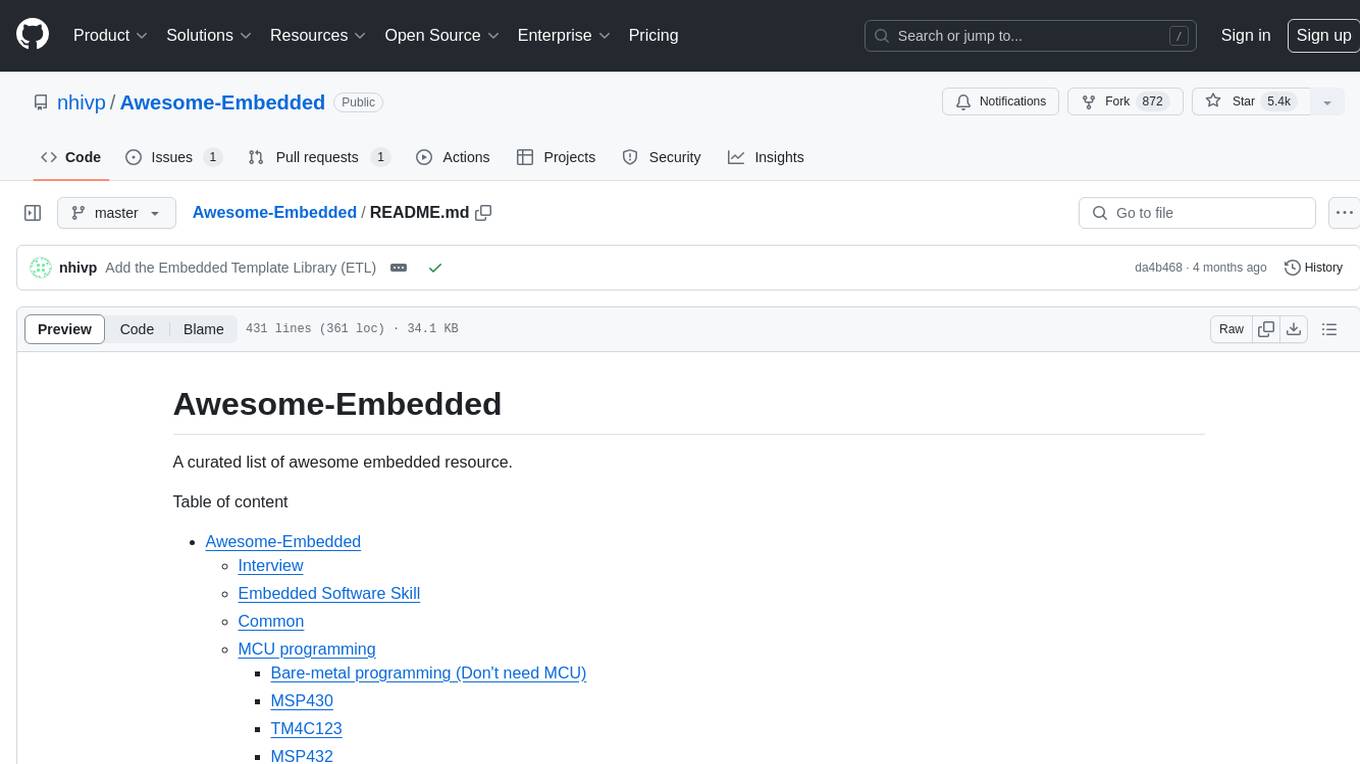
Awesome-Embedded is a curated list of resources for embedded systems enthusiasts. It covers a wide range of topics including MCU programming, RTOS, Linux kernel development, assembly programming, machine learning & AI on MCU, utilities, tips & tricks, and more. The repository provides valuable information, tutorials, and tools for individuals interested in embedded systems development.
README:
A curated list of awesome embedded resource.
Table of content
- Awesome-Embedded
- Tech blogs
- Embedded Interview Questions
- Interview Questions Archive by Company
- coding-interview-university - A complete computer science study plan to become a software engineer.
- 16 Essential Skills for Embedded Engineer
- How to be low-level programmer
- Programmer Competency Matrix
- Integer size in C on 32-bit and 64-bit system
- TeraTerm - TTL command reference
- TeraTerm Scripts
- Linker Command File Primer
- The C build process
- Building Bare-Metal ARM Systems with GNU
- ELF – Executable and Linkable Format
- Toolchains
- What is an application binary interface (ABI)?
- ARM Cortex M4 Blink Example (Linker Script)
- A Sample Linker Script
- Linking and Loading
- Embedded Software _ Getting started
- How to convert from an armlink scatter file to a GNU ld linker script
- Using the GNU Linker
- Simplest bare metal program for ARM (table of content)
- Bare metal programming guide - a detailed guide for beginners
- Real-Time C++ - companion bare-metal code to Real-Time C++ book.
- MSP430-GCC
- CS4101: Introduction to Embedded Systems - The course is designed around labs, using TI MSP430 LaunchPad and Arduino Uno to discuss concepts such as basic I/O, timing and clocking, interupt handling, serial communication, embedded operating systems, synchronization, etc.
- msp430-template - A template for MSP430 firmware.
- MSP430 reference
- EmbeddedSystems.Playground
- Macros in TivaWare
- Analog to Digital Conversion, Data Acquisition and Control
- Embedded Systems - Shape The World
- HowTo: Develop on the TI Tiva LaunchPad using Linux
- Linux command line build system to generate binaries for TM4C123 (ARM Cortex M4)
- The complete tutorial for Stellaris LaunchPad development with GNU/Linux (I)
- Getting Started with the TI Stellaris LaunchPad on Linux
- Embedded Systems with TM4C123 @Valvano
- Create FreeRTOS Demo Project using the GCC Compiler
- Serial bootloader on TM4C12x Microcontroller
- Tivaware bootloader
- Diagnosing Common Development Problems and Tips & Info for TM4C Devices
- FreeRTOS-GCC-tm4c123glx - A port of FreeRTOS to the Texas Instruments Tiva TM4C123GLX Launchpad.
- Stellaris_TM4C123G_GCC_Template - Texas Instruments template project for the TM4C123 series using GNU toolchain.
- tm4c-gcc - TM4C123 GCC project template.
- tivaapps - Example hello-world apps for Texas Instruments TI-RTOS for Tiva C using a Linux host
- Drivers and examples - Drivers for internal peripherals and external modules for Tiva C, examples of FreeRTOS features under development/FreeRTOS
- Real-Time Bluetooth Networks - UTAustinX - Learn the design fundamentals of a real-time operating system (RTOS) and how to build a Bluetooth network in this hands-on project-based course.
- STM32 bootloader
- Tests to program STM32 Nucleo in C with GCC ARM embedded toolchain and libopencm3
- A demo project of FreeRTOS running on a STM32F4 Discovery board.
- DFU Bootloader for STM32 chips
- Customizable Bootloader for STM32 microcontrollers.
- Lightweight USB device Stack for STM32 microcontrollers
- STM32 programming with Embedded GNU Compiler
- A tiny portable 3D graphics lib for micro controllers (Oled display)
- Getting started with the STM32F4-Discovery board using the EmBitz IDE
- libopencm3 and FreeRTOS projects using the STM32F103C8T6 MCU
- A template for builting STM23F0 ARM projects with GCC
- Open source flash program for STM32 using the ST serial bootloader
- stm32-hid-bootloader - Driverless USB HID bootloader and flashing tool for STM32F10X devices
- stm32l1xx-template - A template for building firmware for the STM32L1xx.
- STM32F103C8 Examples
- stm32f103 - Bare metal programming on a generic STM32F103c8 board
- stm32_samples
- stm32f4de example code
- stm32f4xx with Rust at the HAL - A series of tutorials for building STM32F4xx applications with Rust.
- stm32-rf-scanner - STM32 and nRF24L01+ based 2.4GHz RF scanner
- stm32-dc-dc - STM32 based DC-DC converter
- rustlink - small set of Rust tools to program STM32 devices
- stm8-bare-min - Tiny peripheral library for STM8S
- stm8-bootloader - Serial bootloader for STM8S microcontrollers
- stm8-multi-tasker - STM8-Multi-Tasker - Preemptive/Cooperative Round Robin Scheduler for STM8
- Wolk STM8 stuff
- STM8S001J3_tiny_board - A tiny dev board for STM8S001J3 MCU designed in KiCad.
- An open source bootloader for the ESP8266
- An esp8266 rom creation tool
- Wi-FI ESP8266 learning journey
- Wi-FI ESP32 learning journey
- Sming - ESP8266/ESP32 IoT Framework
- Raspberry Pi Bare Metal & related link
- ChibiOS/RT on the Raspberry Pi
- Raspberry Pi ARM based bare metal examples
- Bare metal Raspberry Pi 3 tutorials
- Open Projects: Raspberry, Beaglebone BSP
- A Real-Time Operating System on the Raspberry Pi
- A port of FreeRTOS to the raspberry pi
- FreeRTOS Sucessfully Ported
- Exploring AArch64 assembler - Raspberry
- A bootloader for the Raspberry Pi using the ethernet device
- Bare Metal Raspberry Pi
- Bare Metal Programming in C
- Baking Pi – Operating Systems Development
- Search for 'Raspberry' topic on Github
- elinux: Raspberry Pi Programming or elinux: RPi Hub
- Stanford CS104e - An Experimental Course on Operating Systems
- Computer Systems
- Build a Debian-based ARM64 system for Raspberry Pi 3
- Learning operating system development using Linux kernel and Raspberry Pi
- A port of FreeRTOS to the raspberry pi 2B. With USB+Ethernet+TCP/IP.
- 64-bit Tiano Core UEFI for the Raspberry Pi 3
- CXCORE-RaspberryPi3-ubuntu-18.04-aarch64
- Sample source: Baremetal source code for Raspberry
- Sample source: NarcOS - A bare metal ultralight kernel for Raspberry Pi 3
- Sample source: FreeRTOS v9.0.0 port for Raspberry Pi 1
- Sample source: A bare-metal experiments with the RaspberryPi
- 「BareMetalで遊ぶ Raspberry Pi」のプログラムです。
- UEFI for RaspberryPi2 and RaspberryPi3 based on Linaro EDK2
- ARM-episodes & ARM exploitation for IoT
- ARM shellcode and exploit development - BSidesMunich 2018
- 64 bit Bare Metal Programming on RPI-3
- Raspberry Pi 3 Bare Metal
- Assembly code for Raspberry Pi
- A public Baremetal Raspberry Pi code
- Raspberry-Pi Bare Metal Tutorial
- uCOS-II on Raspberry Pi
- Porting uCOSII to the raspberry pi A+/B+/2B
- Bare-metal examples
- Bare-metal lab
- Exploring Raspberry Pi: Interfacing to the Real World with Embedded Linux {book}
- Exploring Raspberry Pi: Interfacing to the Real World with Embedded Linux {website}
- BeagleBone Black I2C References
- Learning BeagleBone Python Programming
- Simple implementation of an OS for the BeagleBoard C4 with ARMv7 A8 processor.
- Various projects that utilize low level hardware instructions to interface with leds, speaker output and joystick input.
- Windows Embedded Compact BSP for TI's Beaglebone
- BBB-BareMetal- Works on the beaglebone black (bare metal)
- Running a Baremetal Beaglebone Black & Part 2
- Bare Metal on the BeagleBone (Black and Green) & link1 + Link2
- A tutorial on bare-metal [OS] development on the Texas Instruments BeagleBoard.
- bare metal c project for beaglebone, ti sitara am335x
- Bare Metal Applications on OSD335x using U-Boot
- bbb-asm-demo - Extremely tiny baremetal application for BeagleBone Black
- Beaglebone - Getting started with JTAG and CCS
- BeagleBoardJTAG
- beaglebone_samples
- FreeRTOS for BeagleBone Black
- Linux inside - A little bit about a linux kernel
- Writing device drivers in Linux
- YOLINUX Tutorials
- Linux driver programming
- Free training materials and conference presentations
- eBook: Linux Drivers or Slides: Linux Drivers
- c-periphery - A C library for peripheral I/O (GPIO, SPI, I2C, MMIO, Serial) in Linux.
- OpenEmbedded,
- Linux driver practices
- Linux Kernel Exploitation - A bunch of links related to Linux kernel exploitation
- Linux Kernel Module Cheat
- Start linux kernel module development!
- Minimal Linux Live - a tiny educational Linux distribution
- low-level programming university #linux-kernel-and-device-driver
- Yocto Project - Create custom Linux-based systems regardless of the hardware architecture.
- Buildroot - Simple, efficient and easy-to-use tool to generate embedded Linux systems through cross-compilation.
- List of open source real-time operating systems
- ROS
- FreeRTOS
- FreeRTOS - Explaination
- FreeRTOS API Reference Documentation
- How to Write a Small RTOS
- RTOS From Scrach
- mini-arm-os & qemu with a stm32 or here - Build a minimal multi-tasking OS kernel for ARM Cortex-M series from scratch
- Writing a simple operating system from scratch
- Free real-time operating system (RTOS) designed for deeply embedded applications
- MPSoC FreeRTOS Development
- Atomthreads: Open Source RTOS
- High performance motor control
- MINIX3: Open source RTOS
- 30 Days make OS --> YOS @Yannik
- Community: OSDEV.org, reddit/osdev
- Real-time System Group
- object-oriented C++ RTOS for microcontrollers
- RT-Thread is an open source IoT operating system from China.
- How to create an OS from scratch
- Sample Source: TetrOS is a small feature rich Tetris clone which is written in Assembly.
- Sample Source: RTOS for microcontrollers
- Sample Source: A Powerful embedded RTOS for ARM Cortex M microcontrollers
- Sample Source: An embedded operating system for ARM Cortex-M based microcontrollers
- Sample Source: rnk is a RTOS targeting ARM architecture.
- Sample Source: RTOS-From-Scratch
- Sample Source: Embeded OS for PIC32MX270F256B
- How I ended up writing a new real-time kernel
- Sample Source: TNeo - a well-formed and carefully tested preemptive real-time kernel for 16- and 32-bits MCUs
- yaos is an embedded operating system for Internet of Things(IoT) devices, specifically for a single-core processor without MMU virtualization.
- RT-Thread for Raspberry Pi 2B
- tock - A secure embedded operating system for Cortex-M based microcontrollers.
- AliOS-Things - AliOS Things released by Alibaba is an open-source implementation of operating system (OS) for Internet of Things (IoT).
- CoRTOS & CoRTOS Simple Cooperative RTOS - An open source minimalist RTOS.
- µOS++ Reference
- TNKernel - a compact and very fast real-time kernel for the embedded 32/16/8 bits microprocessors.
- Femto OS - a very concise portable real time - preemptive operating system (RTOS) for embedded microcontrollers with minimal ram and flash, say 2KB .. 16KB flash and 128 .. 1024 bytes ram.
- Sample Source: Trampoline is a static RTOS for small embedded systems. & labs
- Sample source: An integration an example AUTOSAR project which every part in AUTOSAR (OS, RTE, BSW, MCAL) are collected from different open source.
- automotive software(OSEK & AUTOSAR) - Because I am not powerful so I decided to develop tiny but smart part of automotive software based on open source, and create a general AUTOSAR & Automotive Software study environment.
- ucLinux: The Embedded Linux/Microcontroller project is a port of Linux to systems without a Memory Management Unit (MMU).
- Tizen
- Bootstrap yourself to write an OS from scratch. A book for self-learner.
- Kernel 101 – Let’s write a Kernel
- The little book about OS development
- TetrOS - Tetris that fits into the boot sector.
- Writing a Simple Operating System from Scratch
- JamesM's kernel development tutorials
- Bare Bones - a simple kernel for 32-bit x86 and boot it.
- Operating System Development Series
- 7 Steps to Writing a Simple Cooperative Scheduler
- A simple OS kernel for research, teaching, and fun
- Operating Systems C Term 2018
- GuruCE Blog
- Windows CE Base Team Blog
- DevWinCE blog
- Windows Embedded Compact BSP for Raspberry Pi
- Windows Embedded Board Support Package for BeagleBone
- Writing a boot loader in Assembly and C
- Writing a Bootloader Part 3
- A bootloader for ARM Cortex-M based microcontrollers
- OpenBLT - an open source and portable bootloader for microcontrollers.
- ARMv7M ELF loader
- Writing a Bootloader Part 1
- can-bootloader - The bootloader used to flash our CAN-connected boards
- Bootloaders 101
- Understand boot process: link1, link2, link3
- Keywords: hello world bootloader, writing a bootloader from scratch, how to write a bootloader in assembly, ...
- Building Hardware Components for Memory Protection of Applications on a Tiny Processor
- KeyStone Architecture: Memory Protection Unit (MPU)
- tinyusb - An open source USB stack for a variety of Embedded Systems.
- A practical approach to Kalman filter and how to implement it
- Embedded System programming: Diving into Syllabus for investigation.
- ELC 2018 Presentations
- ARM Edition: Sparky ARM Edition is a Sparky version created for a single board mini computer RaspberryPi.
- The gem5 Simulator is a well-known sophisticated simulator used for computer system research at both architecture and micro-architecture levels. Main page is here.
- LineageOS Android Distribution
- The NoCAN platform
- Realtime OS on Embedded Systems
- These projects were produced in the five weeks of ECE 4760 each year.
- Advanced fault backtrace library for ARM Cortex-M series MCU
- mcu-starter-projects - Simple starter projects for bare-metal MCU development.
- DirtyJTAG - JTAG adapter firmware for STM32F1
- Generic_MCU_Software_Infrastructure - Provide necessary software infrastructure, service, macros to support some high level abstruct concept or paradigm, such as OOPC, FSM, delegate (event-driven) and etc.
- apollo - An open autonomous driving platform.
- A C++ template library for embedded applications
- Embedded Wizard - Sophisticated GUI for Your Embedded Platform
- lvgl - Graphics library to create an embedded GUI with easy-to-use graphical elements, beautiful visual effects and low memory footprint. It offers anti-aliasing, opacity, and animations using only one frame buffer.
- nnom - A higher-level Neural Network library for microcontrollers.
- nn4mp
- Embedded Learning Library (ELL) - Microsoft's library to deploy intelligent machine-learned models onto resource constrained platforms and small single-board computers.
- Qualcomm Neural Processing SDK for AI - Libraries to developers run NN models on Snapdragon mobile platforms taking advantage of the CPU, GPU and/or DSP.
- CMSIS NN - A collection of efficient neural network kernels developed to maximize the performance and minimize the memory footprint of neural networks on Cortex-M processor cores.
- ARM Compute Library - Set of optimized functions for image processing, computer vision, and machine learning.
- uTensor - AI inference library based on mbed (an RTOS for ARM chipsets) and TensorFlow.
- EmbededAI - A library that provides elements of AI to C++ applications.
- kann - A lightweight C library for artificial neural networks.
- m2cgen - A CLI tool which allows to transpile trained classic ML models into a native code of various programming languages with zero dependencies including C.
- lm4tools
- mspdebug - Debugging tool for MSP430 MCUs
- pycs - Python Based ARM CoreSight Debug and Trace Tools
- NaiveSystems Analyze - Static Analysis Tool for Code Security and Compliance
Awesome Cheat Sheets for Developer Utility, like Git, Vim , Tmux, SublimeText, Markdown, Shell.
- What a C programmer should know about memory
- What Every Programmer Should Know About Memory
- What Every C Programmer Should Know About Undefined Behavior part 2 part 3
- A Guide to Undefined Behavior in C and C++
- Software Engineering Takeaways
- Embedsys weekly newsletter
- awesome-c - A curated list of awesome C frameworks, libraries and software.
- A curated list of project-based tutorials in C
- Curated list of project-based tutorials
- Curated list of awesome lists
- A curated list of awesome Raspberry Pi tools, projects, images and resources
- Curated List of Self-Driving Cars and Autonomous Vehicles Resources
- awesome-embedded-systems
- awesome-cheat-sheets - Awesome Cheat Sheets for Developer Utility, like Git, Vim, Tmux, Sublime Text, Markdown, Shell.
- awesome-embedded-rust - Curated list of resources for Embedded and Low-level development in the Rust programming languague.
- theEmbeddedNewTestament.github.io
For Tasks:
Click tags to check more tools for each tasksFor Jobs:
Alternative AI tools for Awesome-Embedded
Similar Open Source Tools

Awesome-Embedded
Awesome-Embedded is a curated list of resources for embedded systems enthusiasts. It covers a wide range of topics including MCU programming, RTOS, Linux kernel development, assembly programming, machine learning & AI on MCU, utilities, tips & tricks, and more. The repository provides valuable information, tutorials, and tools for individuals interested in embedded systems development.
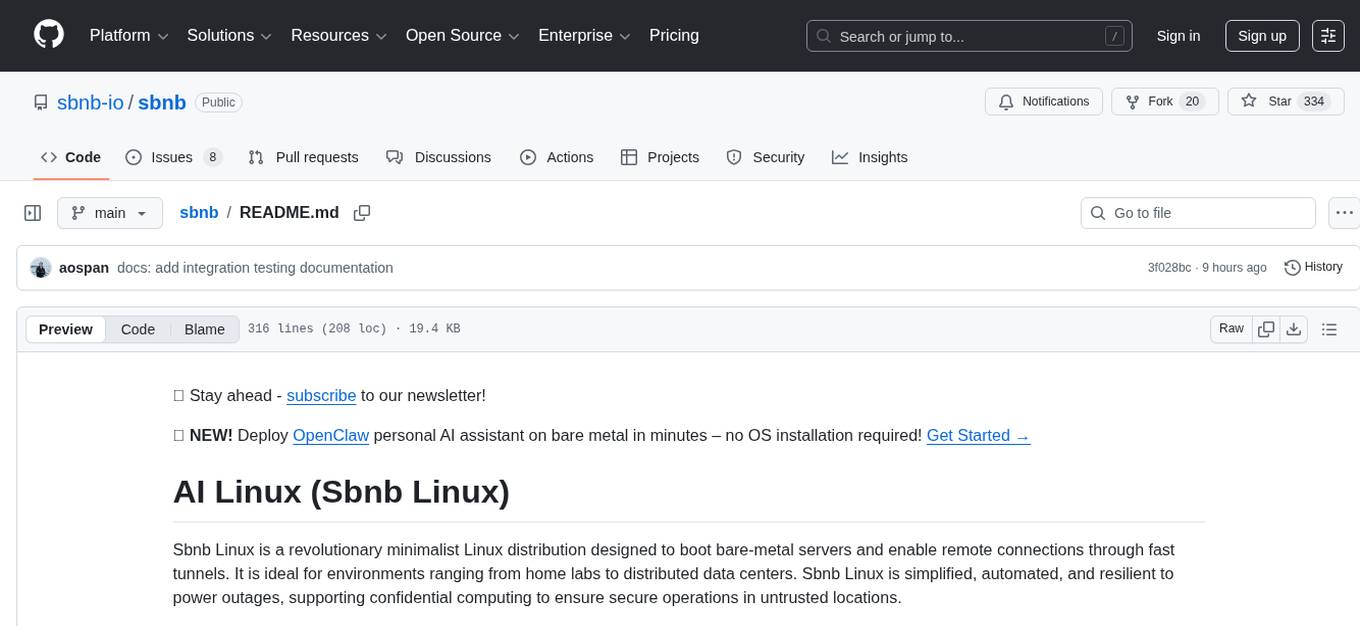
sbnb
Sbnb Linux is a minimalist Linux distribution designed for bare-metal servers, offering fast tunnels for remote connections. It supports confidential computing and is ideal for environments from home labs to distributed data centers. The OS runs in memory, is immutable, and features a predictable update cadence. Users can deploy popular AI tools on bare metal using Sbnb Linux in an automated way. The system is resilient to power outages and supports flexible environments with Docker containers. Sbnb Linux is built with Buildroot, ensuring easy maintenance and updates.
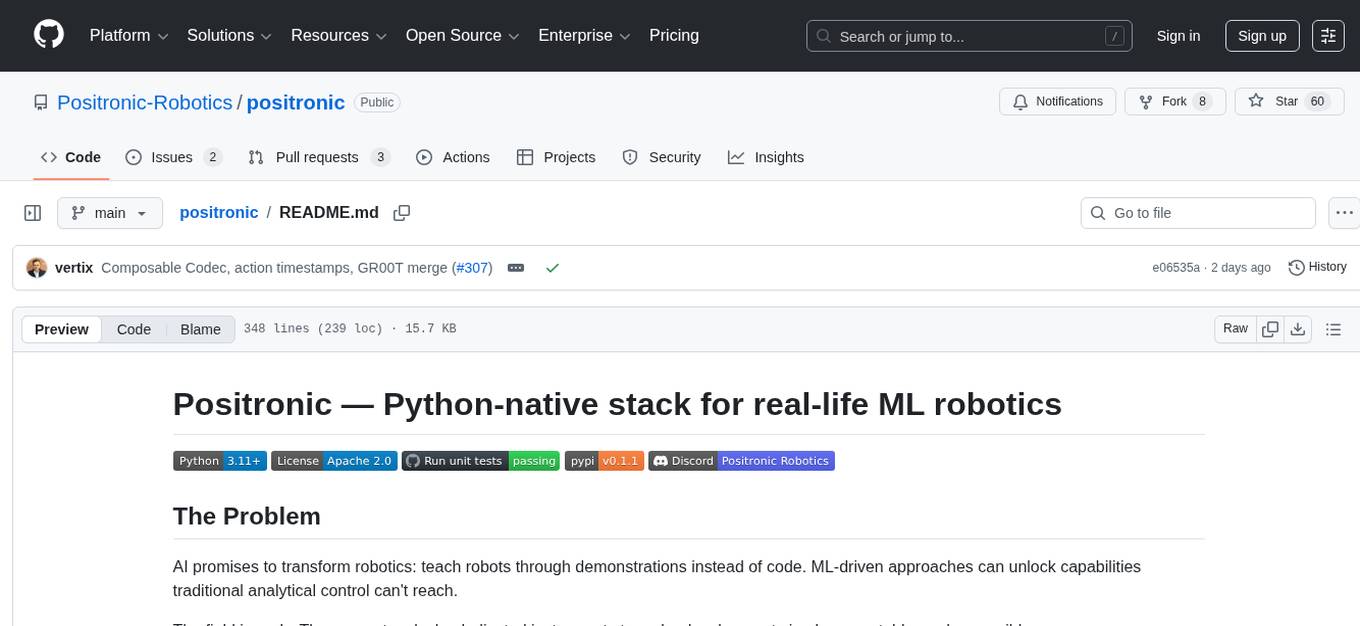
positronic
Positronic is an end-to-end toolkit for building ML-driven robotics systems, aiming to simplify data collection, messy data handling, and complex deployment in the field of robotics. It provides a Python-native stack for real-life ML robotics, covering hardware integration, dataset curation, policy training, deployment, and monitoring. The toolkit is designed to make professional-grade ML robotics approachable, without the need for ROS. Positronic offers solutions for data ops, hardware drivers, unified inference API, and iteration workflows, enabling teams to focus on developing manipulation systems for robots.

openvino
OpenVINO™ is an open-source toolkit for optimizing and deploying AI inference. It provides a common API to deliver inference solutions on various platforms, including CPU, GPU, NPU, and heterogeneous devices. OpenVINO™ supports pre-trained models from Open Model Zoo and popular frameworks like TensorFlow, PyTorch, and ONNX. Key components of OpenVINO™ include the OpenVINO™ Runtime, plugins for different hardware devices, frontends for reading models from native framework formats, and the OpenVINO Model Converter (OVC) for adjusting models for optimal execution on target devices.

UltraRAG
The UltraRAG framework is a researcher and developer-friendly RAG system solution that simplifies the process from data construction to model fine-tuning in domain adaptation. It introduces an automated knowledge adaptation technology system, supporting no-code programming, one-click synthesis and fine-tuning, multidimensional evaluation, and research-friendly exploration work integration. The architecture consists of Frontend, Service, and Backend components, offering flexibility in customization and optimization. Performance evaluation in the legal field shows improved results compared to VanillaRAG, with specific metrics provided. The repository is licensed under Apache-2.0 and encourages citation for support.
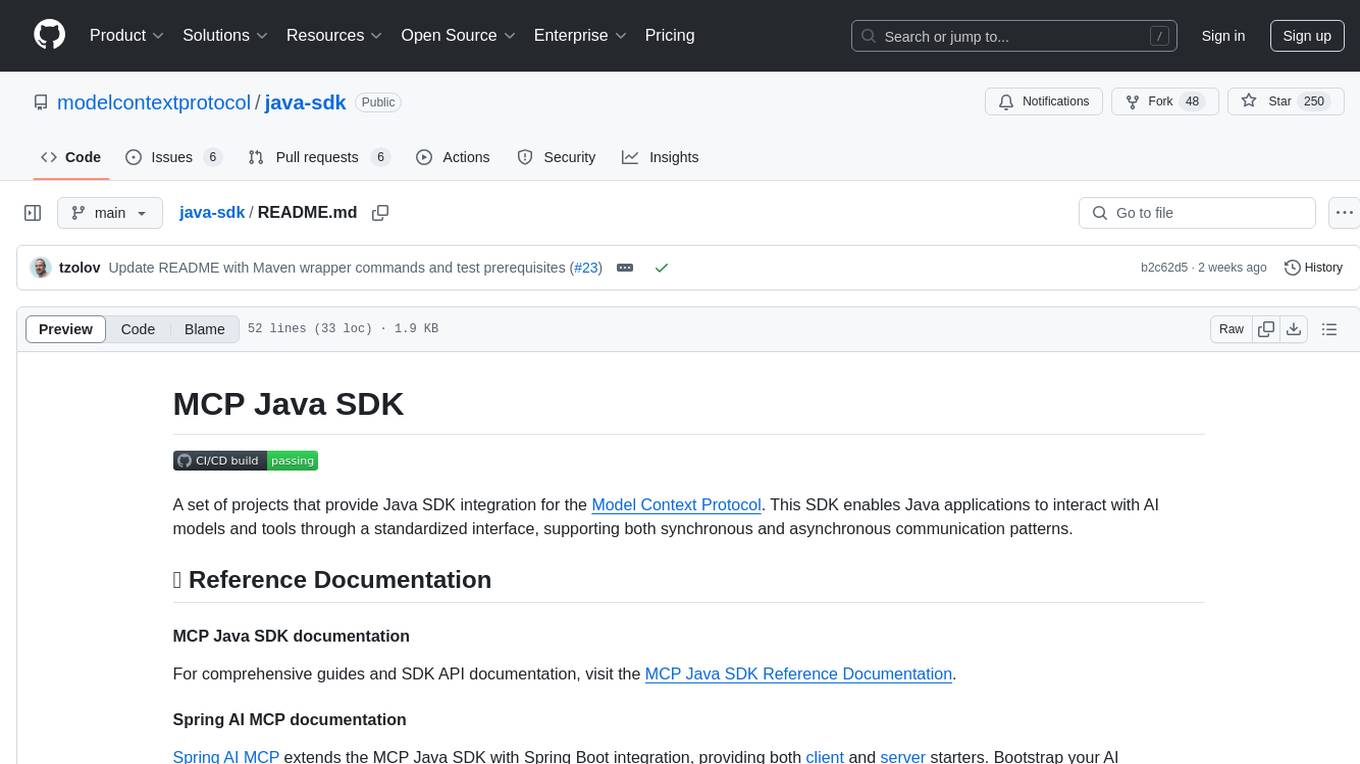
java-sdk
The MCP Java SDK is a set of projects that provide Java SDK integration for the Model Context Protocol. It enables Java applications to interact with AI models and tools through a standardized interface, supporting both synchronous and asynchronous communication patterns.
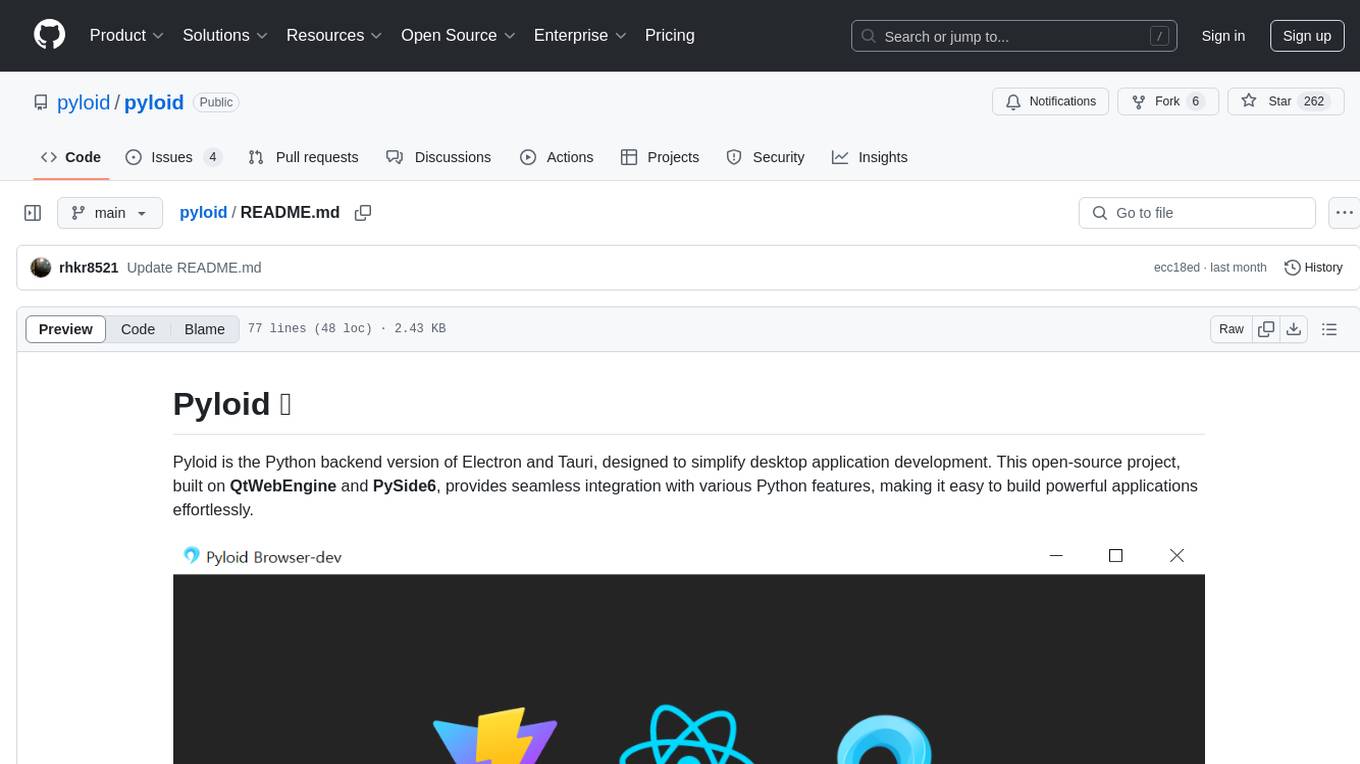
pyloid
Pyloid is a Python backend version of Electron and Tauri, simplifying desktop application development. Built on QtWebEngine and PySide6, it offers seamless integration with Python features, enabling easy creation of powerful applications. It provides web-based GUI generation, system tray icon support, multi-window management, bridge API between Python and JavaScript, single/multi-instance application support, comprehensive desktop app features, clean code structure, live UI development experience, cross-platform support, integration with frontend libraries, window customization, direct utilization of PySide6 features, and detailed Numpy-style docstrings.
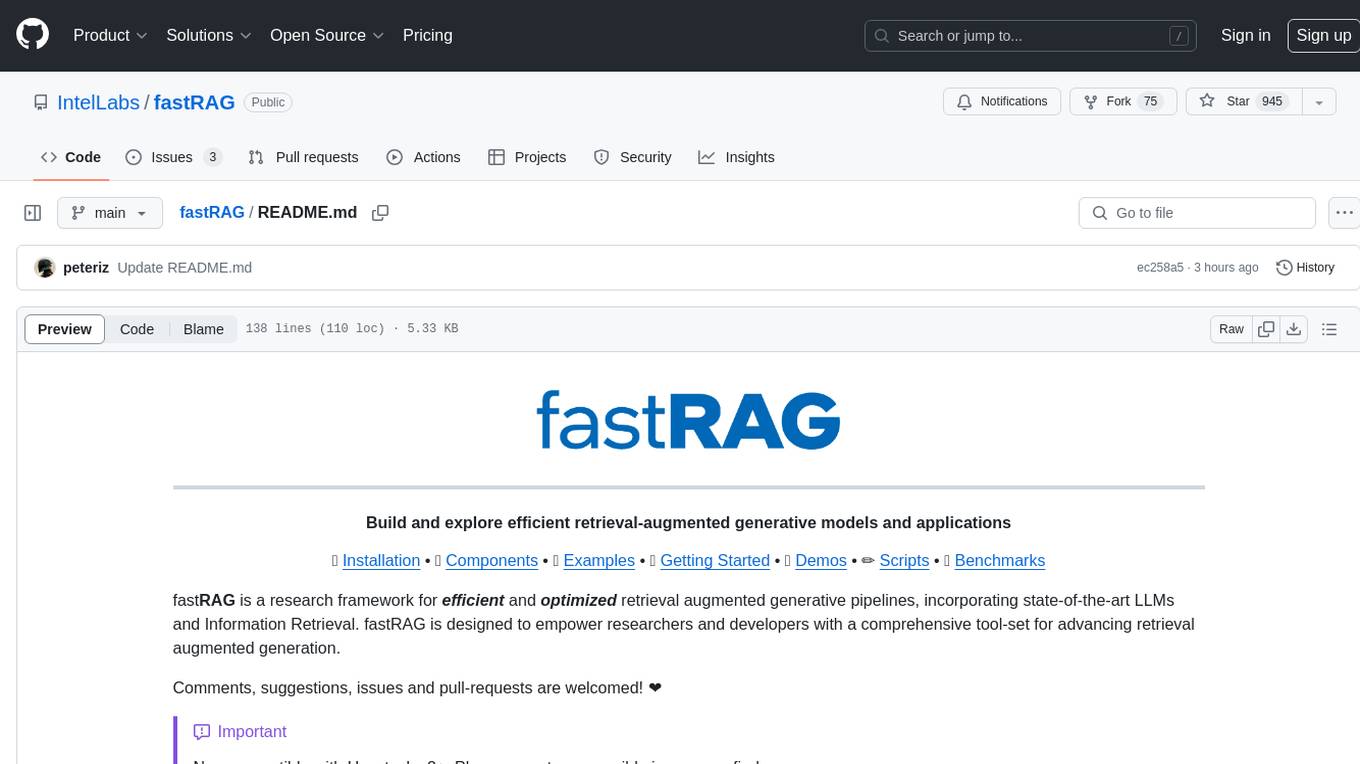
fastRAG
fastRAG is a research framework designed to build and explore efficient retrieval-augmented generative models. It incorporates state-of-the-art Large Language Models (LLMs) and Information Retrieval to empower researchers and developers with a comprehensive tool-set for advancing retrieval augmented generation. The framework is optimized for Intel hardware, customizable, and includes key features such as optimized RAG pipelines, efficient components, and RAG-efficient components like ColBERT and Fusion-in-Decoder (FiD). fastRAG supports various unique components and backends for running LLMs, making it a versatile tool for research and development in the field of retrieval-augmented generation.
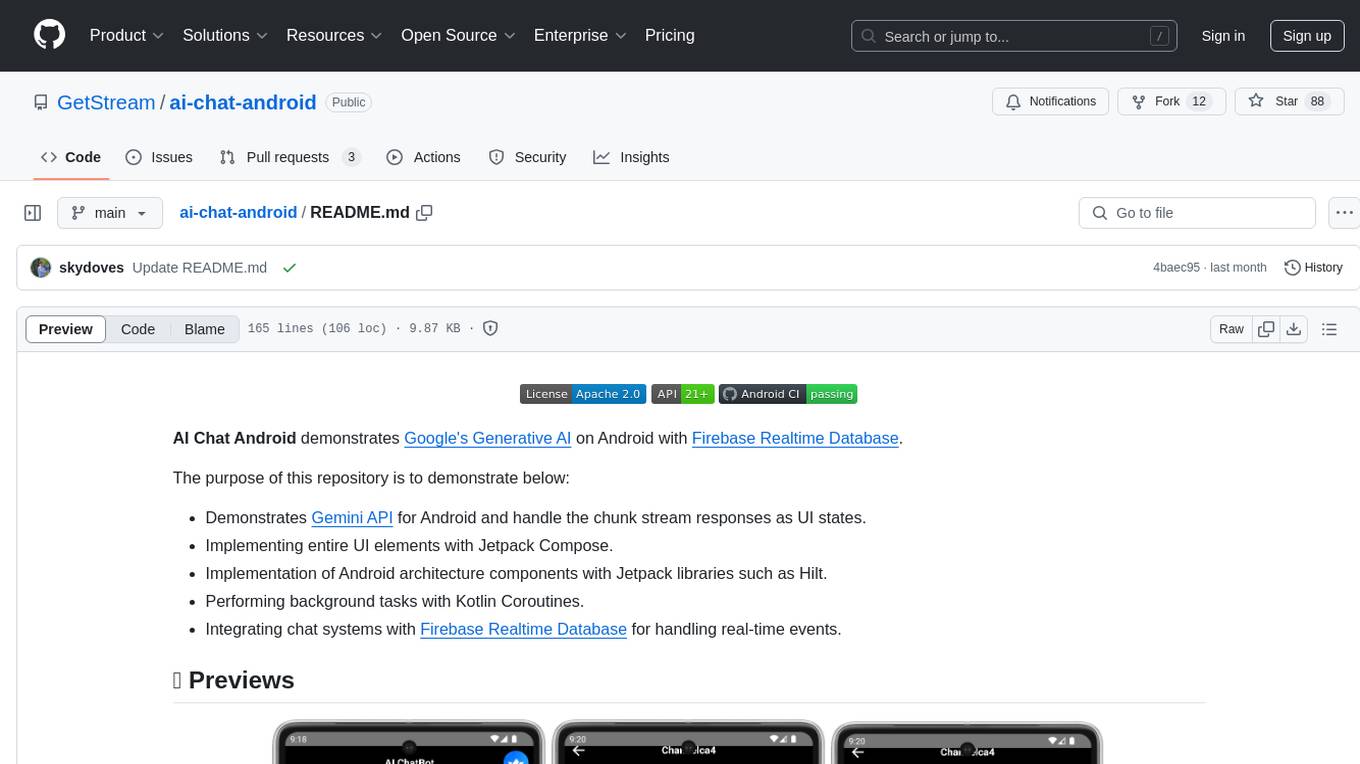
ai-chat-android
AI Chat Android demonstrates Google's Generative AI on Android with Firebase Realtime Database. It showcases Gemini API integration, Jetpack Compose UI elements, Android architecture components with Hilt, Kotlin Coroutines for background tasks, and Firebase Realtime Database integration for real-time events. The project follows Google's official architecture guidance with a modularized structure for reusability, parallel building, and decentralized focusing.
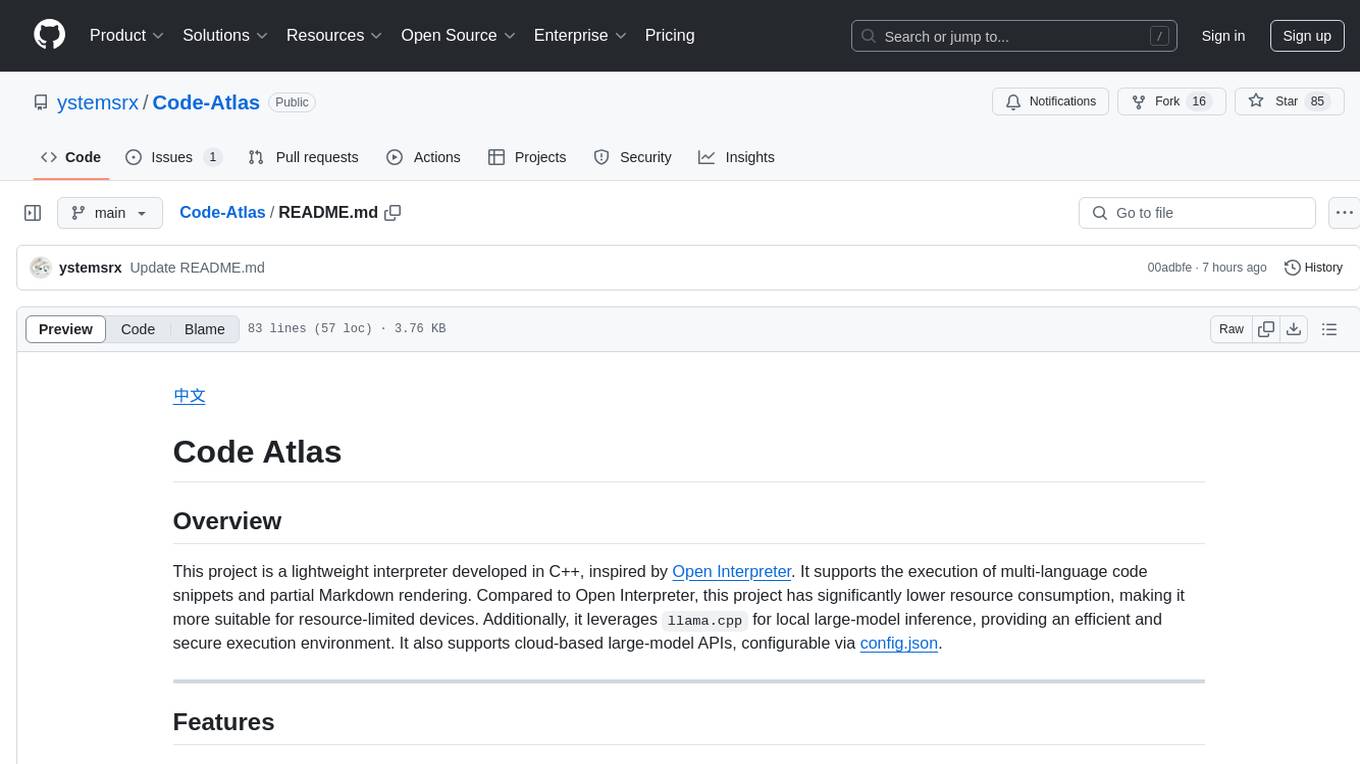
Code-Atlas
Code Atlas is a lightweight interpreter developed in C++ that supports the execution of multi-language code snippets and partial Markdown rendering. It consumes significantly lower resources compared to similar tools, making it suitable for resource-limited devices. It leverages llama.cpp for local large-model inference and supports cloud-based large-model APIs. The tool provides features for code execution, Markdown rendering, local AI inference, and resource efficiency.
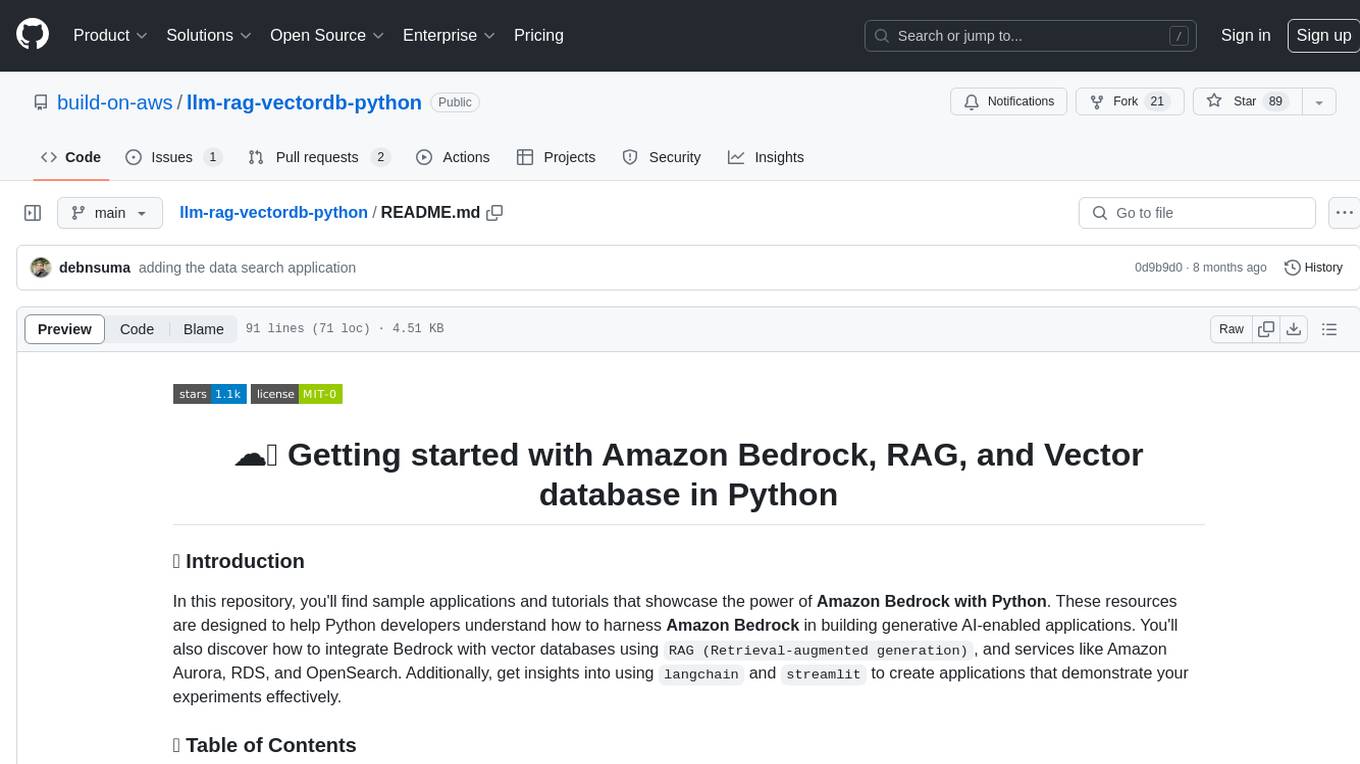
llm-rag-vectordb-python
This repository provides sample applications and tutorials to showcase the power of Amazon Bedrock with Python. It helps Python developers understand how to harness Amazon Bedrock in building generative AI-enabled applications. The resources also demonstrate integration with vector databases using RAG (Retrieval-augmented generation) and services like Amazon Aurora, RDS, and OpenSearch. Additionally, it explores using langchain and streamlit to create effective experimental applications.
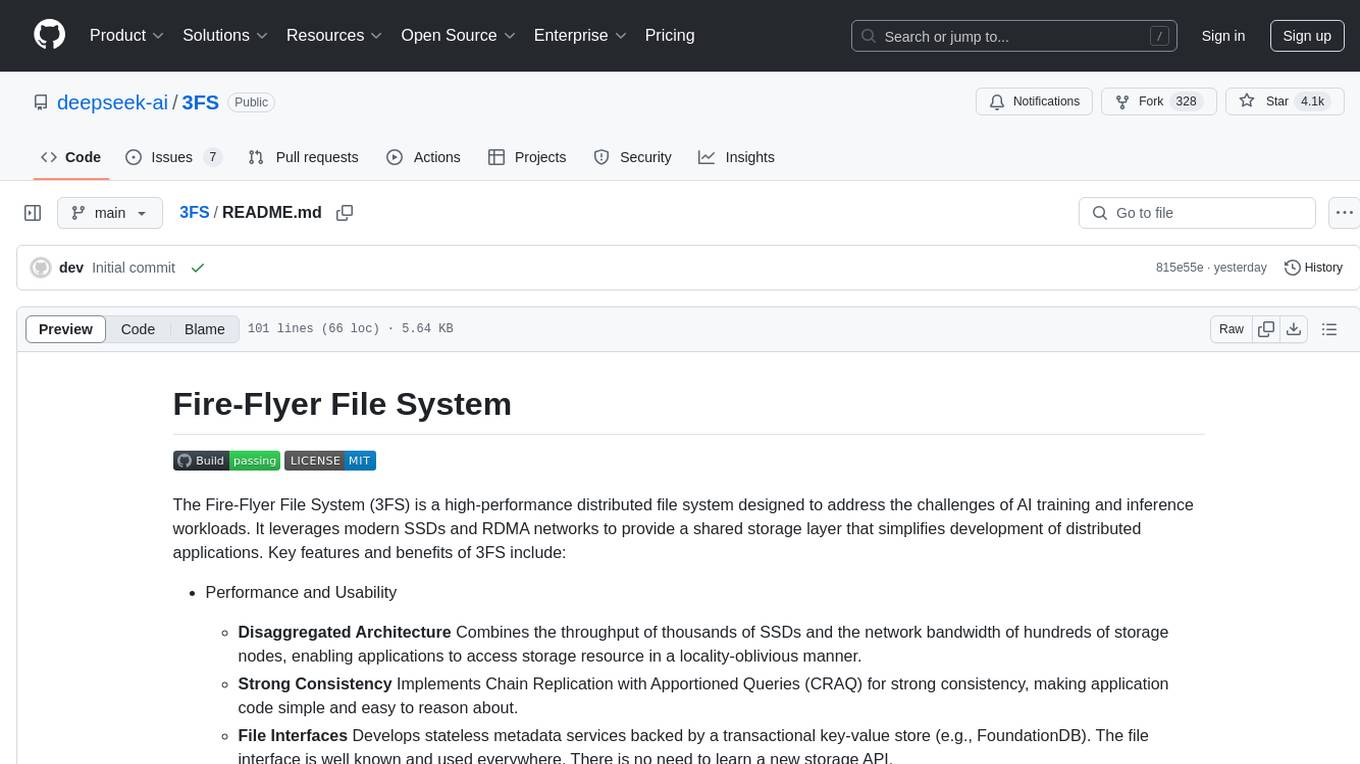
3FS
The Fire-Flyer File System (3FS) is a high-performance distributed file system designed for AI training and inference workloads. It leverages modern SSDs and RDMA networks to provide a shared storage layer that simplifies development of distributed applications. Key features include performance, disaggregated architecture, strong consistency, file interfaces, data preparation, dataloaders, checkpointing, and KVCache for inference. The system is well-documented with design notes, setup guide, USRBIO API reference, and P specifications. Performance metrics include peak throughput, GraySort benchmark results, and KVCache optimization. The source code is available on GitHub for cloning and installation of dependencies. Users can build 3FS and run test clusters following the provided instructions. Issues can be reported on the GitHub repository.
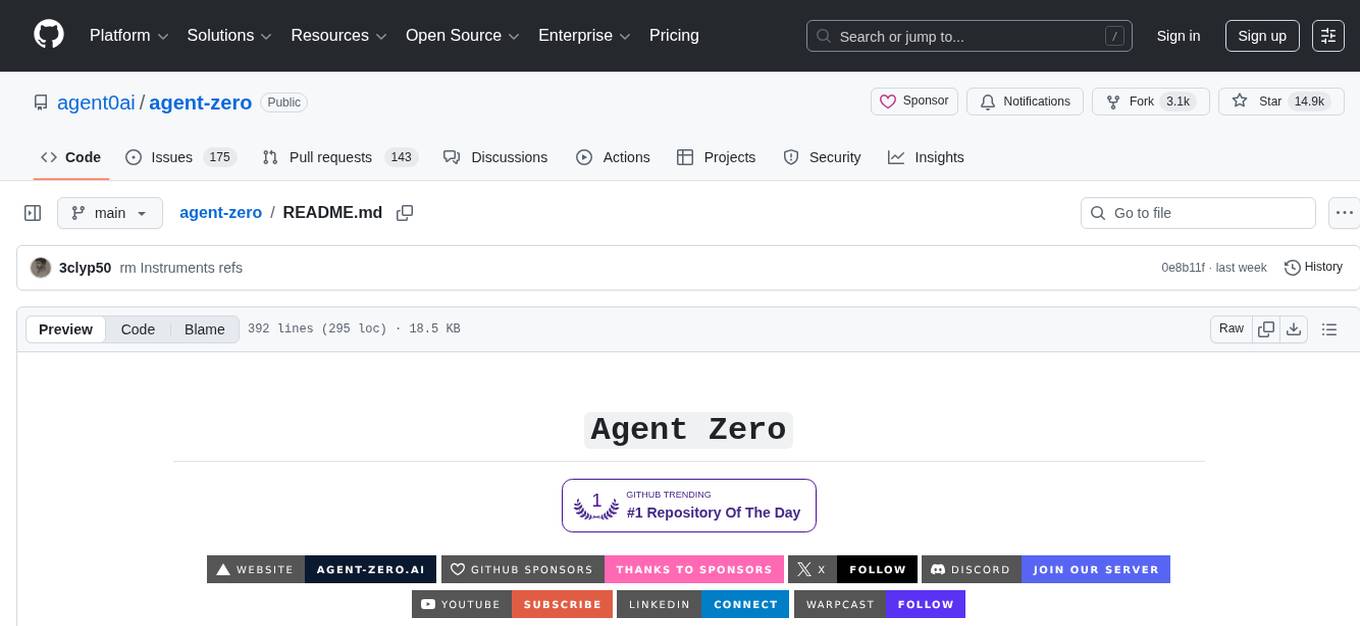
agent-zero
Agent Zero is a personal, organic agentic framework designed to be dynamic, transparent, customizable, and interactive. It uses the computer as a tool to accomplish tasks, with features like general-purpose assistant, computer as a tool, multi-agent cooperation, customizable and extensible framework, and communication skills. The tool is fully Dockerized, with Speech-to-Text and TTS capabilities, and offers real-world use cases like financial analysis, Excel automation, API integration, server monitoring, and project isolation. Agent Zero can be dangerous if not used properly and is prompt-based, guided by the prompts folder. The tool is extensively documented and has a changelog highlighting various updates and improvements.
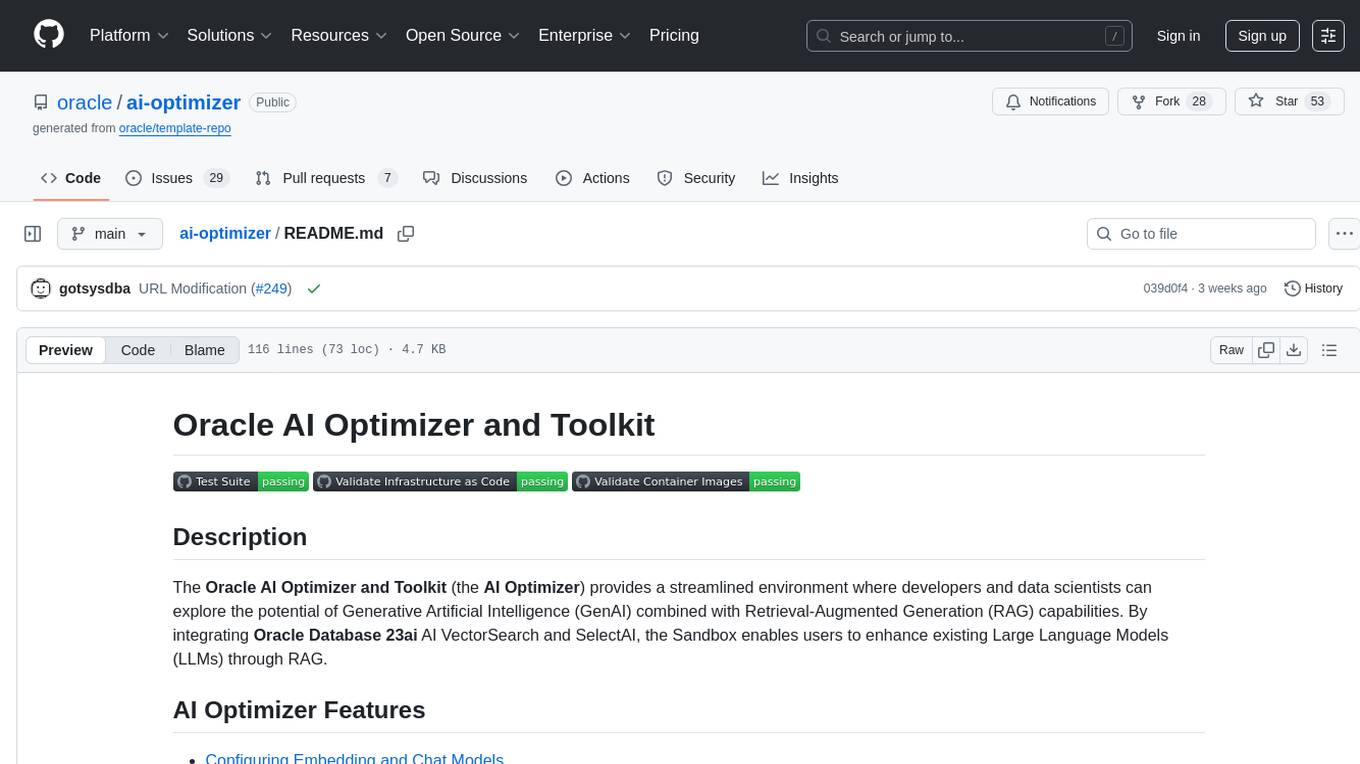
ai-optimizer
The Oracle AI Optimizer and Toolkit provides a streamlined environment for developers and data scientists to explore Generative Artificial Intelligence (GenAI) and Retrieval-Augmented Generation (RAG) capabilities. It integrates Oracle Database 23ai AI VectorSearch and SelectAI to enhance Large Language Models (LLMs) through RAG.
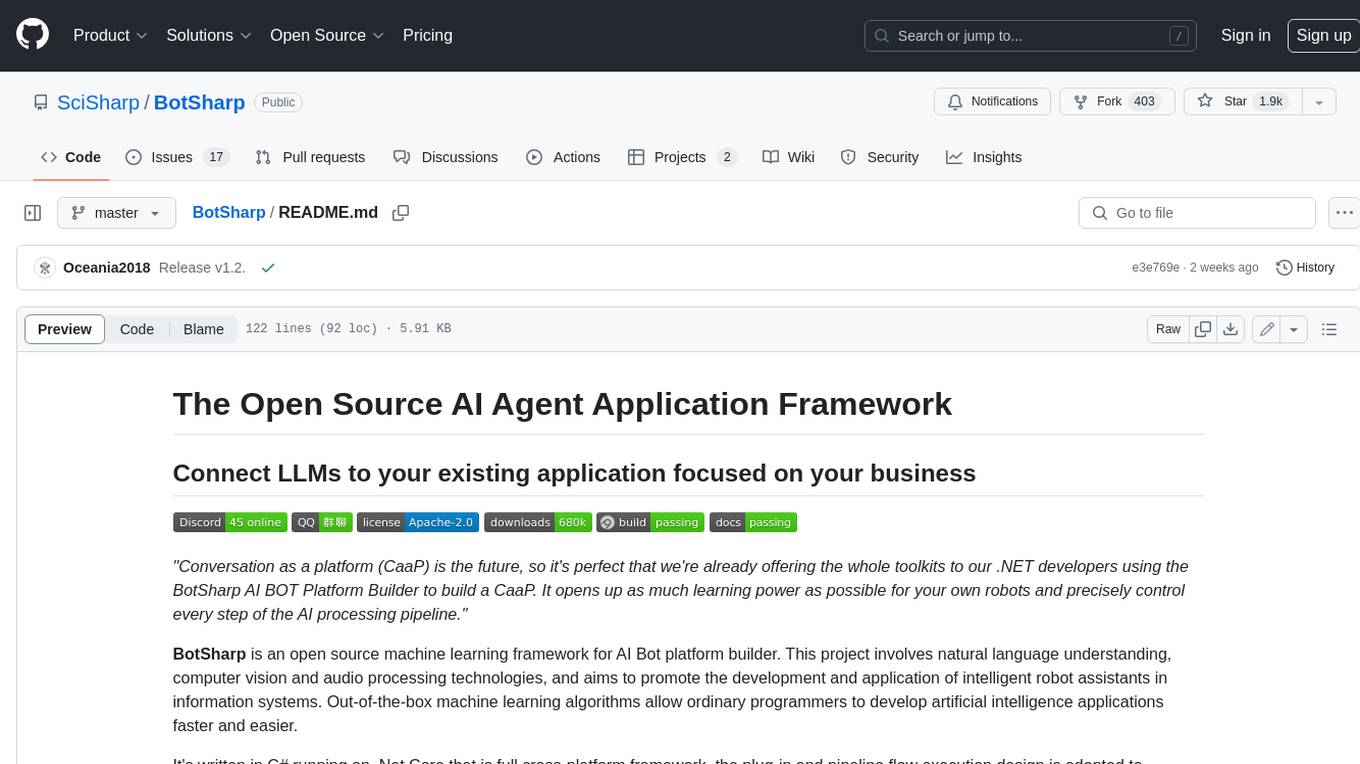
BotSharp
BotSharp is an open-source machine learning framework for building AI bot platforms. It provides a comprehensive set of tools and components for developing and deploying intelligent virtual assistants. BotSharp is designed to be modular and extensible, allowing developers to easily integrate it with their existing systems and applications. With BotSharp, you can quickly and easily create AI-powered chatbots, virtual assistants, and other conversational AI applications.
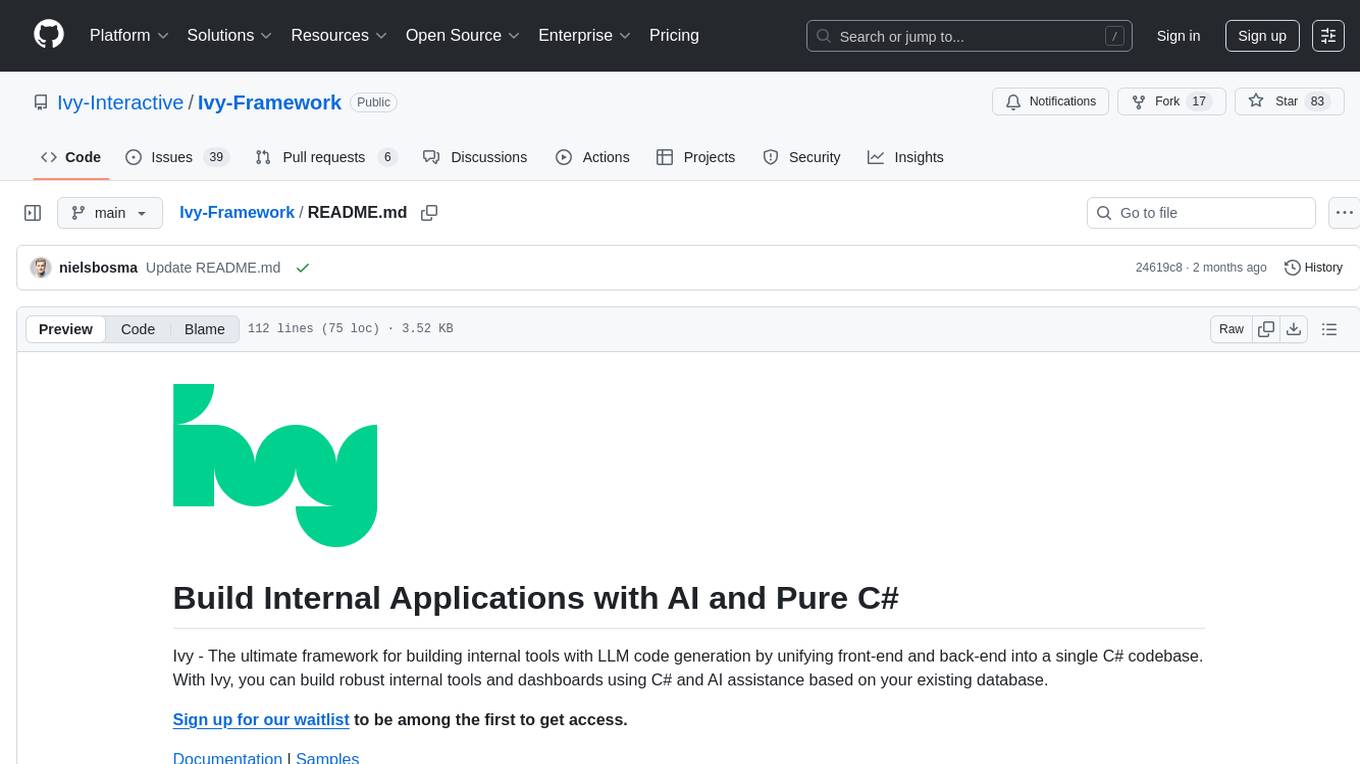
Ivy-Framework
Ivy-Framework is a powerful tool for building internal applications with AI assistance using C# codebase. It provides a CLI for project initialization, authentication integrations, database support, LLM code generation, secrets management, container deployment, hot reload, dependency injection, state management, routing, and external widget framework. Users can easily create data tables for sorting, filtering, and pagination. The framework offers a seamless integration of front-end and back-end development, making it ideal for developing robust internal tools and dashboards.
For similar tasks

Awesome-Embedded
Awesome-Embedded is a curated list of resources for embedded systems enthusiasts. It covers a wide range of topics including MCU programming, RTOS, Linux kernel development, assembly programming, machine learning & AI on MCU, utilities, tips & tricks, and more. The repository provides valuable information, tutorials, and tools for individuals interested in embedded systems development.
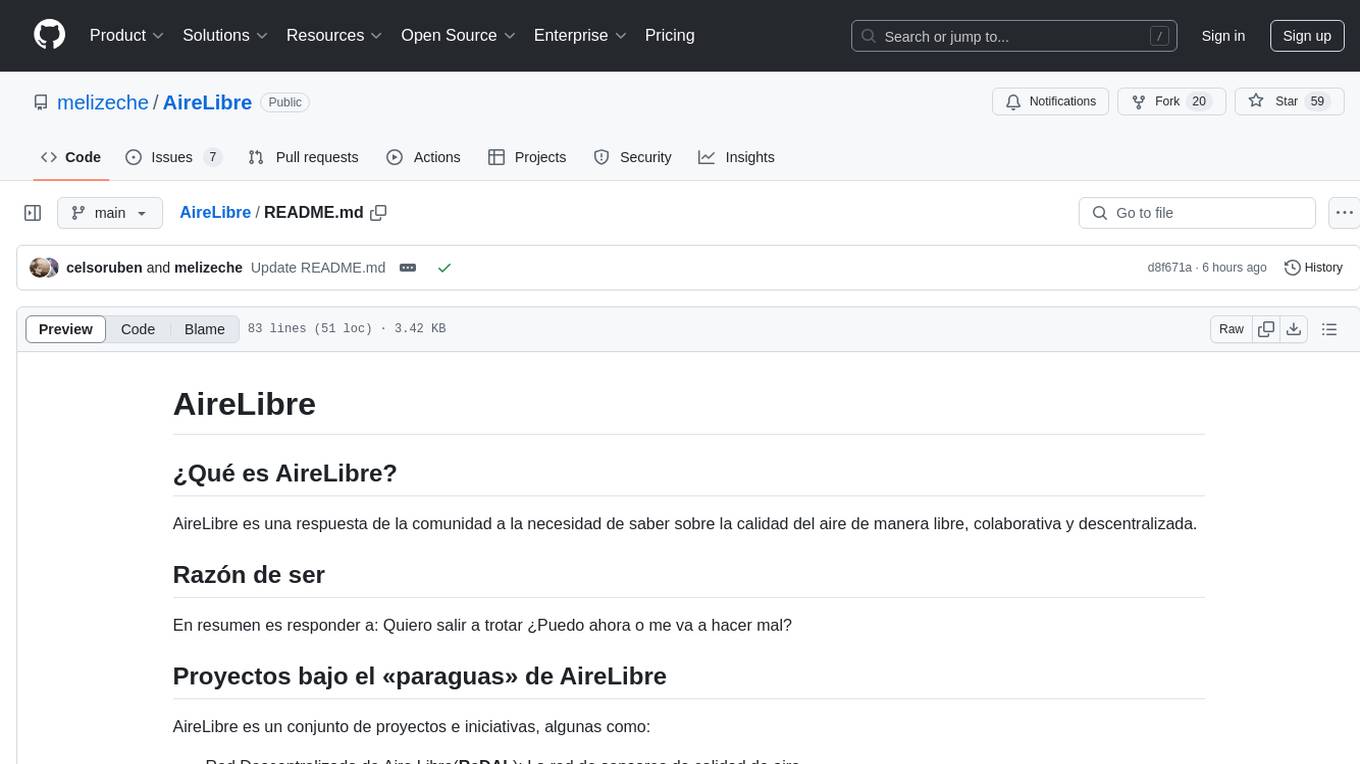
AireLibre
AireLibre is a community response to the need for freely, collaboratively, and decentralized air quality information. It includes projects like Red Descentralizada de Aire Libre (ReDAL), Linka, Linka Firmware, LinkaBot, AQmap, and Android/iOS apps. Users can join the network with a sensor communicating with Linka. Materials and tools are needed to build a sensor. The initiative is decentralized and open for community collaboration. Users can extend or add projects to AireLibre. The license allows for creating personal networks. AireLibre is not for professional/industrial/scientific/military use, and the sensors are not calibrated in Switzerland.
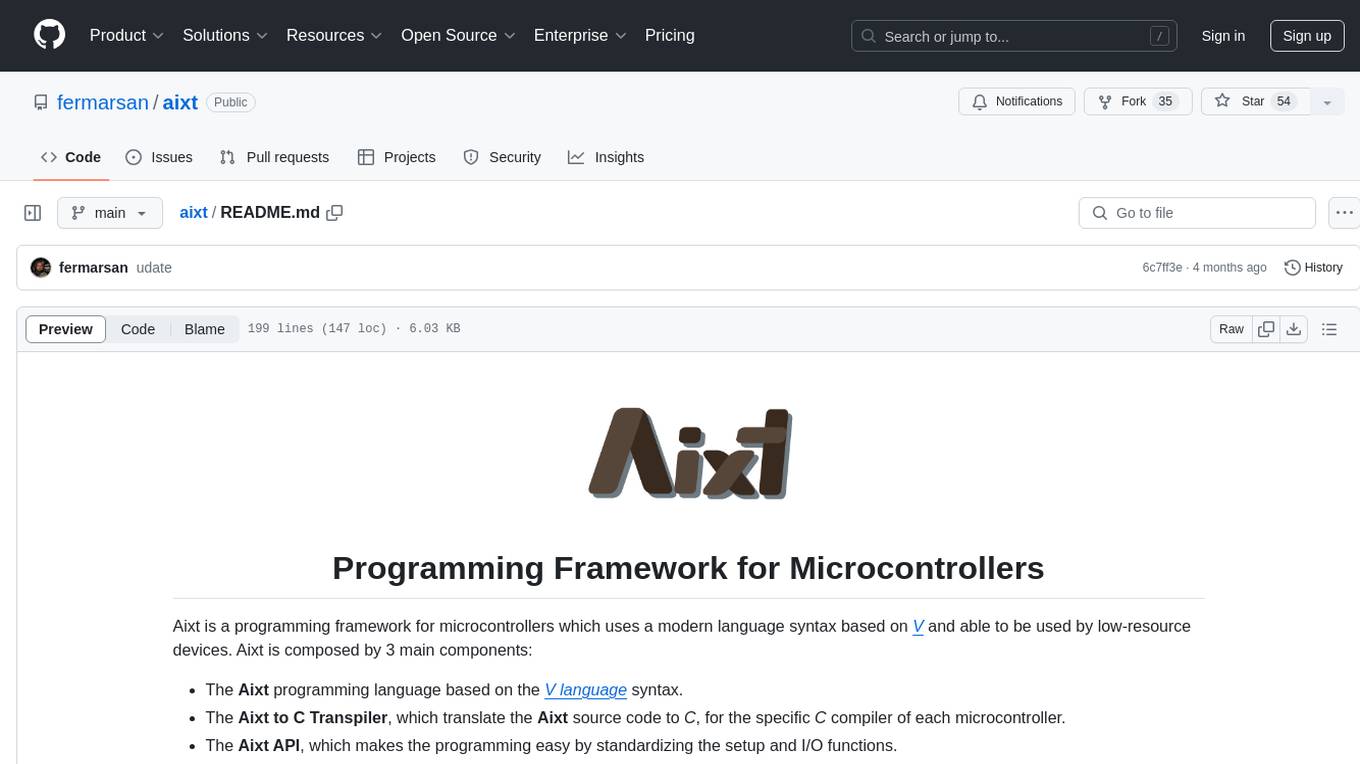
aixt
Aixt is a programming framework for microcontrollers using a modern language syntax based on V, with components including the Aixt programming language, Aixt to C Transpiler, and Aixt API. It is designed to be modular, allowing easy incorporation of new devices and boards through a TOML configuration file. The Aixt to C Transpiler translates Aixt source code to C for specific microcontroller compilers. The Aixt language implements a subset of V with differences in variables, strings, arrays, default integers size, structs, functions, and preprocessor commands. The Aixt API provides functions for digital I/O, analog inputs, PWM outputs, and serial ports.
For similar jobs

Awesome-Embedded
Awesome-Embedded is a curated list of resources for embedded systems enthusiasts. It covers a wide range of topics including MCU programming, RTOS, Linux kernel development, assembly programming, machine learning & AI on MCU, utilities, tips & tricks, and more. The repository provides valuable information, tutorials, and tools for individuals interested in embedded systems development.
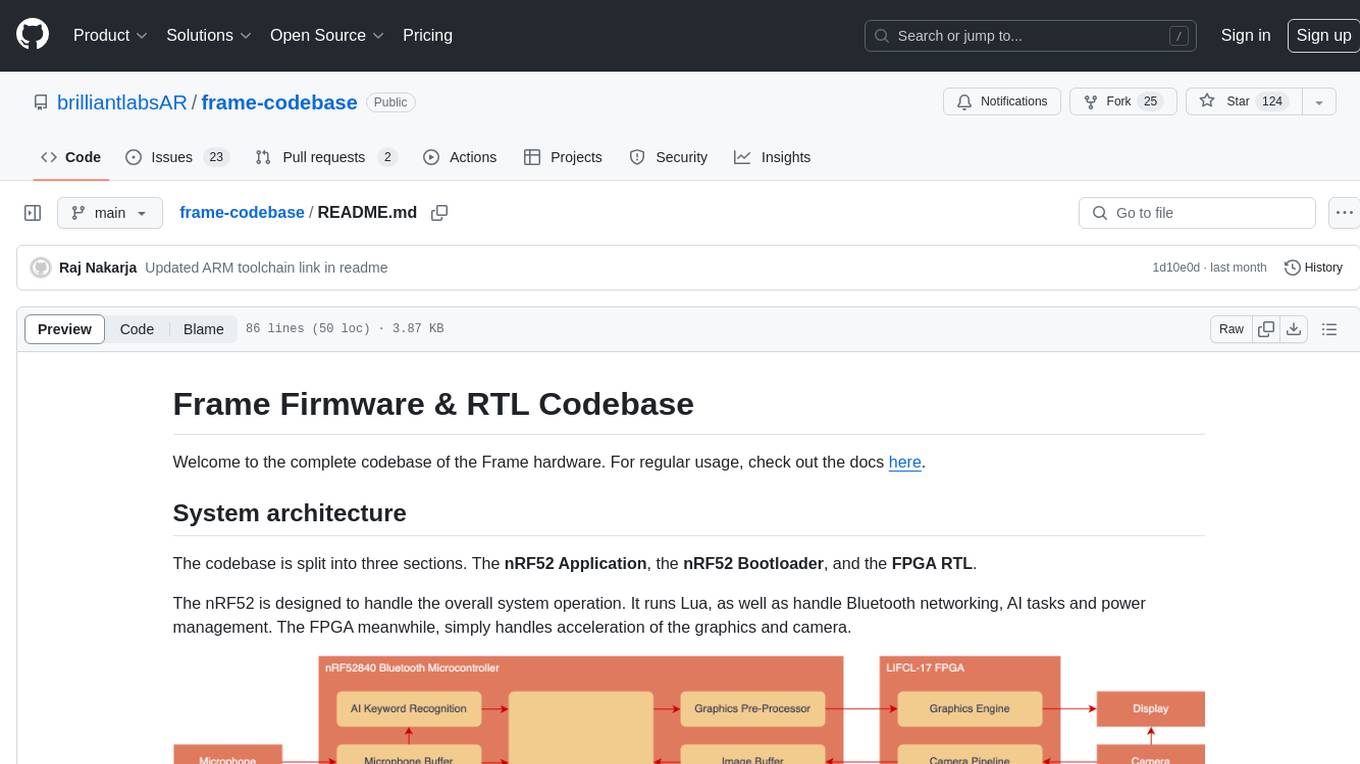
frame-codebase
The Frame Firmware & RTL Codebase is a comprehensive repository containing code for the Frame hardware system architecture. It includes sections for nRF52 Application, nRF52 Bootloader, and FPGA RTL. The nRF52 handles system operation, Lua scripting, Bluetooth networking, AI tasks, and power management, while the FPGA accelerates graphics and camera processing. The repository provides instructions for firmware development, debugging in VSCode, and FPGA development using tools like ARM GCC Toolchain, nRF Command Line Tools, Yosys, Project Oxide, and nextpnr. Users can build and flash projects for nRF52840 DK, modify FPGA RTL, and access pre-built accelerators bundled in the repo.
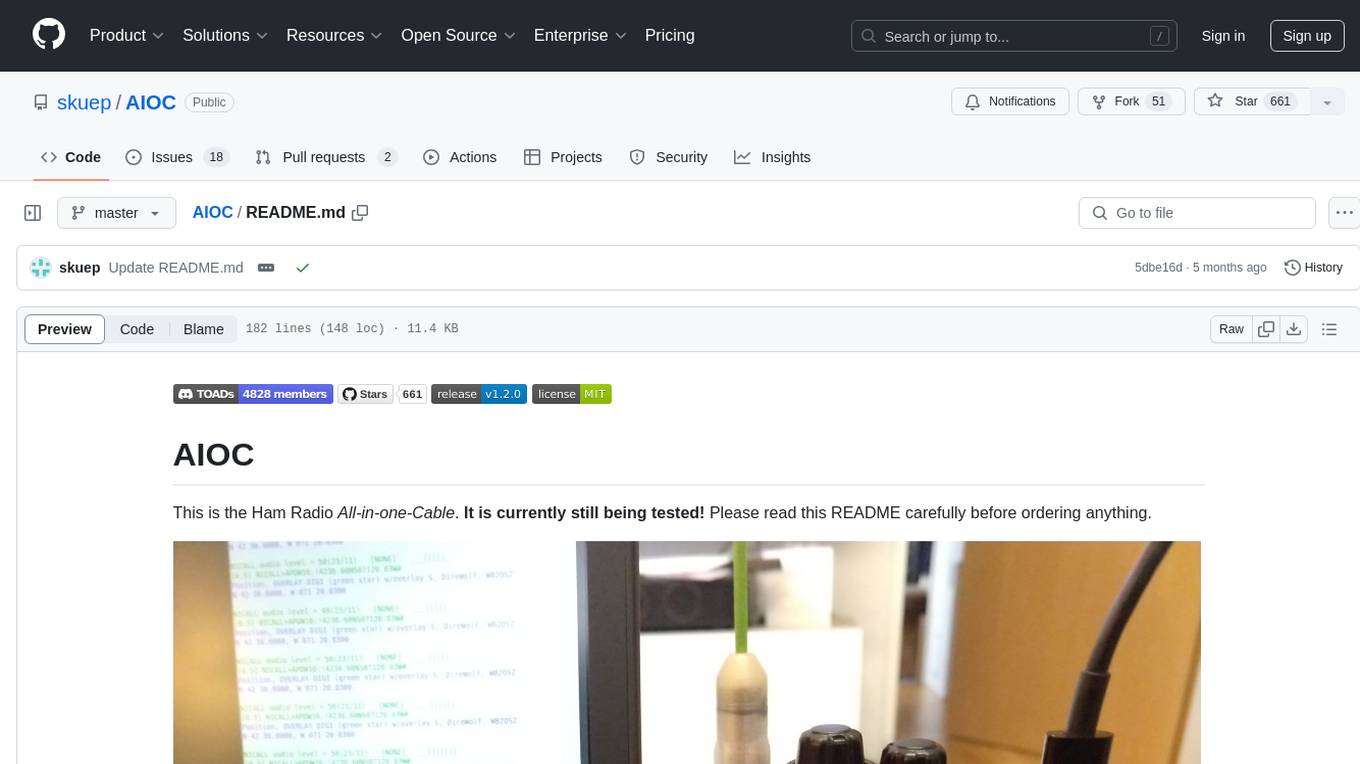
AIOC
AIOC is an All-in-one-Cable for Ham Radio enthusiasts, providing a cheap and hackable digital mode USB interface with features like sound-card, virtual tty, and CM108 compatible HID endpoint. It supports various software and tested radios for functions like programming, APRS, and Dual-PTT HTs. Users can fabricate and assemble the AIOC using specific instructions, and program it using STM32CubeIDE. The tool can be used for tasks like programming radios, asserting PTT, and accessing audio data channels. Future work includes configurable AIOC settings, virtual-PTT, and virtual-COS features.

aixt
Aixt is a programming framework for microcontrollers using a modern language syntax based on V, with components including the Aixt programming language, Aixt to C Transpiler, and Aixt API. It is designed to be modular, allowing easy incorporation of new devices and boards through a TOML configuration file. The Aixt to C Transpiler translates Aixt source code to C for specific microcontroller compilers. The Aixt language implements a subset of V with differences in variables, strings, arrays, default integers size, structs, functions, and preprocessor commands. The Aixt API provides functions for digital I/O, analog inputs, PWM outputs, and serial ports.
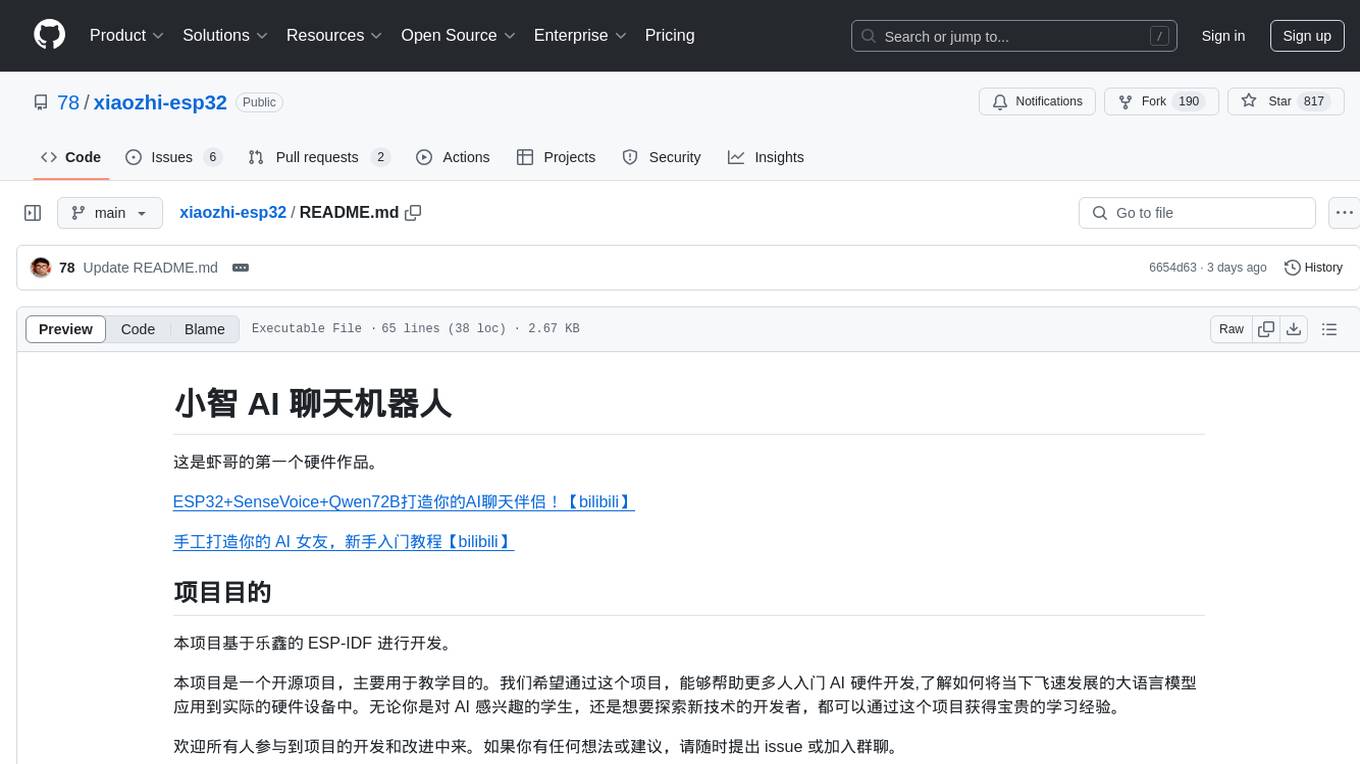
xiaozhi-esp32
The xiaozhi-esp32 repository is the first hardware project by Xia Ge, focusing on creating an AI chatbot using ESP32, SenseVoice, and Qwen72B. The project aims to help beginners in AI hardware development understand how to apply language models to hardware devices. It supports various functionalities such as Wi-Fi configuration, offline voice wake-up, multilingual speech recognition, voiceprint recognition, TTS using large models, and more. The project encourages participation for learning and improvement, providing resources for hardware and firmware development.